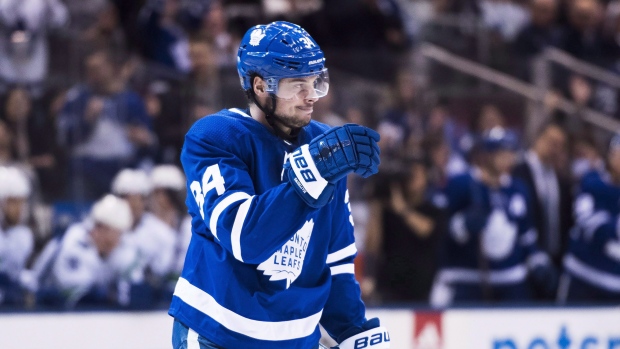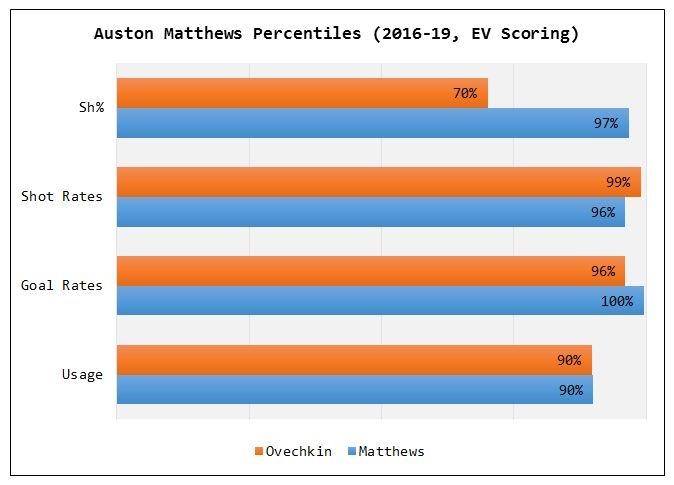Sep 9, 2019
Matthews the best bet to unseat Ovechkin for Rocket Richard Trophy
It would be foolish to bet against the Russian sniper, but if you had to pick one player who has a real chance to take his crown this season it’s the Maple Leafs centre, Travis Yost writes.
By Travis Yost

There was an interesting article over at The Hockey News last week identifying the top candidates to win the Rocket Richard Trophy this season.
The favourite, until proven otherwise, will remain Washington Capitals winger Alexander Ovechkin. Ovechkin has been the league’s top goal scorer in six of the last seven years. And unlike virtually all of his peers, it doesn’t appear that the age regression bug is set to bite anytime soon. In some ways it reminds me of Tom Brady and the New England Patriots. What is true for the vast majority of the playing population may not be true for one individual player, especially when that player is a bona fide superstar.
So bet against Ovechkin at your own peril. It does raise an interesting question, though: if not Ovechkin, then who?
My short answer is Toronto’s Auston Matthews, followed closely by Edmonton’s Connor McDavid. (McDavid is indisputably the best player in the world, but there is a significant team talent advantage in favour of the Leafs centre.)
The argument in support of Matthews is relatively straightforward. From 2016-17 through the 2018-19 regular season, no player has been more effective at scoring even-strength goals on a rate basis than Matthews, and it isn’t particularly close. For every 60 minutes of hockey, Matthews scores 1.55 goals. That’s 16 per cent better than second place, owned by Nashville’s Viktor Arvidsson (1.33). Matthews and Arvidsson, statistically speaking, are the only two outliers across 281 regular NHL forwards in the three-year period.
On a mere effectivity argument, Matthews might be the most logical candidate – even ahead of the aforementioned Ovechkin. Consider his percentiles relative to a player like Ovechkin, who not only has won top goal-scoring honours nearly every season, but will likely retire as one of the two best goal scorers ever:

Matthews and Ovechkin look identical. They both play a lot of minutes, which is important for both opportunity and volume. They both take an incredible amount of shots, and from those shots, generate more goals than just about every other regular forward in the league.
The one differentiating factor is that Matthews is probably a bit more selective – or Ovechkin is a bit less selective, or both – when it comes to converting on scoring opportunities. Matthews not only carries incredible offensive volume, he does so while maintaining a sterling 15 per cent shooting percentage. Ovechkin, on the other hand, sits just over 11 per cent.
If Matthews can stay healthy, his even-strength argument alone might propel him to the top of the candidacy. But even strength isn’t the only game state that matters. Part of what has made Ovechkin so impossible to dethrone as a regular Rocket Richard candidate is the fact he may be the most lethal power-play goal scorer in NHL history. That’s becoming even more meaningful with power-play efficiency increasing in recent years.
It’s also where Matthews sags a bit in performance. If we juxtapose Ovechkin and Matthews’ percentiles again, but this time with a focus on power play performance, you can see an obvious shortfall:
The data bears out what we see with Washington’s power play and their usage of Ovechkin as the first unit (and, sometimes the second unit as well) trigger man. What Washington figured out very early in Ovechkin’s career is that playing him as much as possible in those 5-on-4 and 5-on-3 situations was hugely advantageous. (To his credit, Ovechkin over the years has become brilliant at playing extended power-play shifts while only exerting significant energy in spots.)
This is where the uphill climb begins for Matthews. Even assuming Matthews outscores Ovechkin at even strength, he’s going to give a lot of it back here. Not only is he a less effective power-play scorer head-to-head, but there is a significant usage gap. Over the last three years, Ovechkin is averaging more than four minutes of power-play ice time a night. Matthews is a little over two minutes.
Toronto head coach Mike Babcock has always been militaristic about balancing ice time, but I do wonder if that’s disadvantageous when it comes to the power play usage tree. If Matthews is one of the league’s best goal scorers, should he be seeing more usage than players like Gustav Nyquist and Alexander Steen? I think the answer is yes, even while recognizing that Toronto’s forward group is incredibly deep and that the power play protection allows Babcock to use him marginally more at even strength.
That said, I do think they’ll look to get him more power-play ice time this season. Mitch Marner, the team’s second most utilized power-play forward, may not be available to start the season. Nazem Kadri, the team’s third most utilized power-play forward, is in Colorado. Patrick Marleau, who was No. 5 from last season is also gone. That should mean more minutes marginally for the team’s top power-play unit, including Matthews.
So no, I’m still not going to bet against Ovechkin. But if you asked me to pick one player who has a serious shot at taking the Russian sniper down this season, it’s Matthews.

